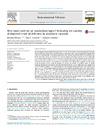Identificador persistente para citar o vincular este elemento:
https://accedacris.ulpgc.es/jspui/handle/10553/75413
| Campo DC | Valor | idioma |
|---|---|---|
| dc.contributor.author | Almeda, Rodrigo | en_US |
| dc.contributor.author | Connelly T.L | en_US |
| dc.contributor.author | Buskey E. | en_US |
| dc.date.accessioned | 2020-11-11T13:51:26Z | - |
| dc.date.available | 2020-11-11T13:51:26Z | - |
| dc.date.issued | 2016 | en_US |
| dc.identifier.issn | 0269-7491 | en_US |
| dc.identifier.uri | https://accedacris.ulpgc.es/handle/10553/75413 | - |
| dc.description.abstract | We investigated and quantified defecation rates of crude oil by 3 species of marine planktonic copepods(Temora turbinata,Acartia tonsa, andParvocalanus crassirostris) and a natural copepod assemblage afterexposure to mechanically or chemically dispersed crude oil. Between 88 and 100% of the analyzed fecalpellets from three species of copepods and a natural copepod assemblage exposed for 48 h to physicallyor chemically dispersed light crude oil contained crude oil droplets. Crude oil droplets inside fecal pelletswere smaller (median diameter: 2.4e3.5mm) than droplets in the physically and chemically dispersed oilemulsions (median diameter: 6.6 and 8.0mm, respectively). This suggests that copepods can reject largecrude oil droplets or that crude oil droplets are broken into smaller oil droplets before or duringingestion. Depending on the species and experimental treatments, crude oil defecation rates ranged from5.3 to 245 ng-oil copepod 1d 1, which represent a mean weight-specific defecation rate of 0.026mg-oilmg-Ccopepod1d 1. Considering a dispersed crude oil concentration commonly found in the water columnafter oil spills (1mlL 1) and copepod abundances in high productive coastal areas, copepods maydefecate ~1.3e2.6 mg-oil m 3d 1, which would represent ~0.15%e0.30% of the total dispersed oil perday. Our results indicate that ingestion and subsequent defecation of crude oil by planktonic copepodshas a small influence on the overall mass of oil spills in the short term, but may be quantitativelyimportant in theflux of oil from surface water to sediments and in the transfer of low-solubility, toxicpetroleum hydrocarbons into food webs after crude oil spills in the sea | en_US |
| dc.language | eng | en_US |
| dc.relation.ispartof | Environmental Pollution | en_US |
| dc.source | Environmental Pollution [ISSN 0269-7491], v. 208, part B, January 2016, Pages 645-654 (January 2016) | en_US |
| dc.subject | 251001 Oceanografía biológica | en_US |
| dc.subject.other | Crude oil | en_US |
| dc.subject.other | Zooplankton | en_US |
| dc.subject.other | Ingestion | en_US |
| dc.subject.other | Fecal pellets | en_US |
| dc.subject.other | Oil spills | en_US |
| dc.title | How much crude oil can zooplankton ingest? Estimating the quantity of dispersed crude oil defecated by planktonic copepods | en_US |
| dc.identifier.doi | 10.1016/j.envpol.2015.10.041 | en_US |
| dc.description.lastpage | 654 | en_US |
| dc.description.firstpage | 645 | en_US |
| dc.relation.volume | 208 | en_US |
| dc.investigacion | Ciencias | en_US |
| dc.type2 | Artículo | en_US |
| dc.description.numberofpages | 10 | en_US |
| dc.utils.revision | Sí | en_US |
| dc.date.coverdate | Enero 2016 | en_US |
| dc.identifier.ulpgc | No | en_US |
| dc.contributor.buulpgc | BU-BAS | en_US |
| dc.description.sjr | 1,786 | |
| dc.description.jcr | 5,099 | |
| dc.description.sjrq | Q1 | |
| dc.description.jcrq | Q1 | |
| dc.description.scie | SCIE | |
| item.fulltext | Con texto completo | - |
| item.grantfulltext | open | - |
| crisitem.author.dept | GIR ECOAQUA: Ecofisiología de Organismos Marinos | - |
| crisitem.author.dept | IU de Investigación en Acuicultura Sostenible y Ecosistemas Marinos (IU-Ecoaqua) | - |
| crisitem.author.dept | Departamento de Biología | - |
| crisitem.author.orcid | 0000-0002-0090-112X | - |
| crisitem.author.parentorg | IU de Investigación en Acuicultura Sostenible y Ecosistemas Marinos (IU-Ecoaqua) | - |
| crisitem.author.fullName | Almeda García, Rodrigo | - |
| Colección: | Artículos | |
Citas de WEB OF SCIENCETM
Citations
31
actualizado el 12-ene-2026
Visitas
58
actualizado el 10-ene-2026
Descargas
66
actualizado el 10-ene-2026
Google ScholarTM
Verifica
Altmetric
Comparte
Exporta metadatos
Los elementos en ULPGC accedaCRIS están protegidos por derechos de autor con todos los derechos reservados, a menos que se indique lo contrario.
